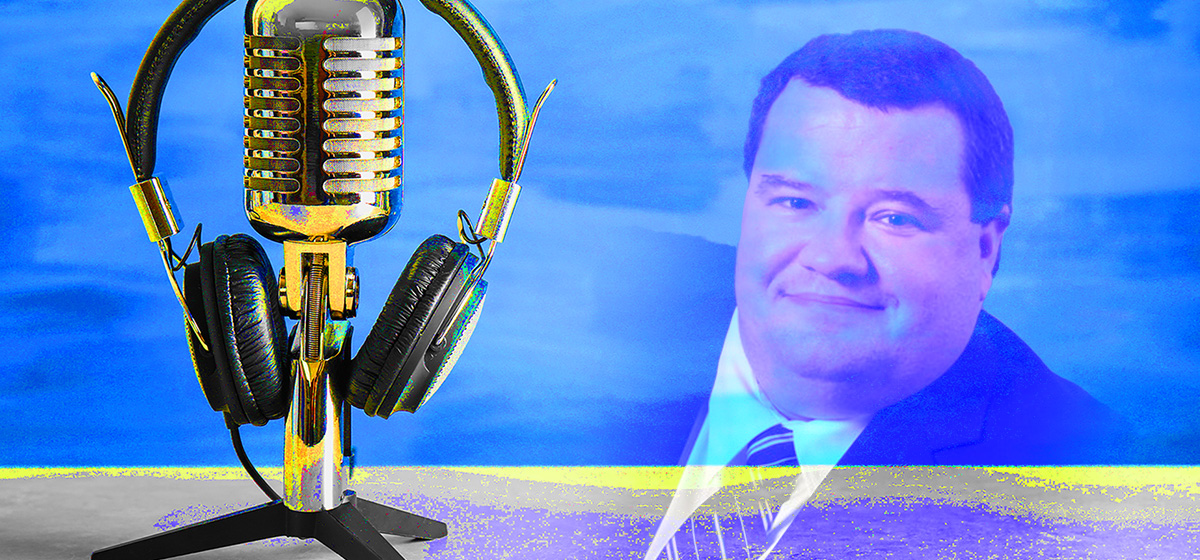Don’t Discuss It—Be It: An Interview With International Businessman David Iwinski

Donald Bonk interviews David Iwinski, attorney and managing director of Blue Water Growth, as part of the Pittsburgh Tomorrow podcast series. This interview was conducted before COVID-19. The transcript is abridged and edited for clarity.
View the episode archive here. Read David Iwinski’s bio here.“Cities, like individuals, have little choice but to achieve their greatness by embracing what latent potential they possess, not seeking out which is beyond their reach or engaging in senseless boosterism and self-promotion.” —David Iwinski
Donald Bonk: Hello. I’m Donald Bonk. I’m here with the Pittsburgh Tomorrow Project. I have with me as my guest today, David Iwinski. We’re in North Huntington Township, just over the border in Westmoreland County. I want to set the scene for this interesting conversation we’re going to have about the future of Pittsburgh. Can you give us a little background on yourself and then follow up with a little bit about what you’re doing now and how you do it?
David Iwinski: I’m a Pittsburgh native and I’m living on a farm in North Huntington. I’m the product of an undergraduate education at Duquesne University, followed by the University of Pittsburgh School of Law. Over my 32 years in business, I’ve worked as an attorney, a manufacturer in China, a tech entrepreneur in India, and I’m currently the managing director and one of the founders of a boutique consultancy firm called Blue Water Growth. We connect the economies of the Far East with the United States. We work in product trade and distribution. We work in financing and capital. And we like to do a little bit of M&A (mergers and acquisition) work between all the Far East countries and North America.
Bonk: That’s fascinating. It’s a really deep, rich history with an international flavor. You have an interesting perspective, both being a native of the region as well as living a substantial number of years outside the country.
The question we have in the series that we lead with is this: What do you believe would make Pittsburgh one of the best cities in the world, or, conversely, the ideal city? Looking at Plato’s Republic, if you had the ideal Pittsburgh, what does that look like for David Iwinski?
Iwinski: I’m glad you lead off with Plato, because it will give my answer more context. The only thing needed for Pittsburgh to be the best city in the world is to never again consider the question of what would make it be the best city in the world.
Over two millennia ago, one of the greatest stoic philosophers of all time, an emperor of Rome, Marcus Aurelius, said, “Waste no more time arguing what a good man should be. Be one.”
Pittsburgh doesn’t need anything. It does need, however, to lose something. It needs to lose our pervasive and gnawing sense of insecurity that somehow, somewhere, some city is better than us, and we’re in some sort of a footrace to establish ourselves to be the best, whatever that is. Cities, like individuals, have little choice but to achieve their greatness by embracing what latent potential they possess, not seeking out which is beyond their reach or engaging in senseless boosterism and self-promotion.
We have a vibrant university presence, strong support for startups, a fair cost of living, access to world class health care, first-class sports teams, safe streets, and one of the greatest cultural districts in the entire planet. All told, pretty dang good. Pittsburgh would be the best city in the world when it finally knows that it is, and simultaneously feels no urge to erect a billboard to that effect. Let us not waste any more time arguing about what would make Pittsburgh the best city in the world. Simply be it.
Bonk: That is a great answer to kick off our talk tonight. Now we want to go to the moonshot idea. The moonshot idea is not only one big transformational idea for the city or the region, but also how it impacts the narrative of the region. So with no further ado, David, what’s your moonshot idea for Pittsburgh?
Iwinski: I am sorely tempted to say we should go back to the moon or press on with a manned mission to Mars, because it frustrates me enormously that we are not putting humans into space and pressing the borders of exploration.
But my recommendation for a moonshot idea is a variant on that same “Back to the Future” notion. Our moonshot would revolutionize energy independence, provide vast and abundant fuel for a soon-to-become a fleet of electric vehicles and mass transit, restrict the use of carbon-based power in order to reduce polluting emissions, and shrink our carbon footprint as a general benefit to the quality of our environment.
The moonshot idea is one that was created in Pittsburgh, developed in Pittsburgh, and then, sadly, one we readily abandoned because of a few early stage mistakes, one unspeakably bad movie, and a lack of political will. We should loudly, proudly and enthusiastically promote and endorse the re-adoption of nuclear power.
Setting aside the potential for some completely unknown and unanticipated breakthrough in renewable and the portability of power, neither wind, solar nor tidal are ever going to provide the breadth and depth to overcome fossil fuels.
If even a small percentage of the energy, financing and commitment that this nation put to getting Neil Armstrong to set foot in the Sea of Tranquility were applied to solving the solvable problems of nuclear energy, a host of human problems would be solved in a single stroke.
Indeed, the amount of money we pour right now into trying to eke out minute improvements in solar or laying down cables to transmit power from the few places with enough persistent breeze to make wind power rational—if that were applied to solving nuclear, we’d be all the way there.
The beauty of the moonshot was that even in 1961, the practical issues of getting to the moon and back safely could be simply broken down into smaller and smaller and smaller problems and then solved in sequence, without any need for a true quantum leap of an extraordinary discovery or the application of magic. It’s exactly the same with nuclear. It’s right in front of us. We simply can apply the breaking down of problems to all the challenges of production and of course, handling the refuse of nuclear power. And we’ve got it.
Bonk: That’s a very enlightening set of comments. Now we’re going move to the final phase here. 1990 and 2050 are equidistant and we’re looking out over the next three decades. We’re here in 2020. So we’re looking at the 2020s, 30s, 40s and up to 2050. What are three practical ideas that Pittsburgh can put in place that would move the ball forward?
Iwinski: Well, the idea of three practical ideas implies that these must be in the realm of the doable, meaning they don’t need a breakthrough or a lot of money. It also implies there are things we should do pretty much right away so that the benefit accrues over these next 30 years.
I like to think of these things as man-on-the-street ideas, things that will improve the quality of life for every person in the city, and I’ve got my three. First, scale bicycle lanes to the width of a single bicycle and no more. Somewhat akin to the notion that gigantic spinning fans in the Alleghenies will power the East Coast. The notion that a vehicular city, which embraces individualism and freedom of automobile traffic, that also has vast populated suburbs, plus an extended and nasty winter season. The notion that we will ever be a mecca for throngs of avid bikers year round, to the extent that a massive portion of our downtown pavement is dedicated to that purpose, is utterly nonsensical. They’re irritating. They reduce the flow of traffic, and they are a monument to political correctness. We don’t even have enough bicycle couriers to make them worthwhile. I think the first thing we can do is cut them down to the width of a bike and be done with it.
Second, we should embrace our wonderful east-west portal tunnels and legislate that they never be enlarged or made to flow faster. I have never understood the desire for more flow through these beautiful tunnels, because despite the frustrations of the Parkway East and West during rush hour, these throttle points not only allow us the magnificent experience of emerging from underground to burst into the city center, but far more importantly, they act as a gate to keep gridlock out of downtown. Anyone who’s ever lived in a major metropolitan city other than Pittsburgh can well appreciate the traffic snarls that we would have if the traffic from the east and west poured unabated into the city center and what a disaster that would be. These are wonderful checkpoints. Let’s leave them alone.
And finally, I think we should apply our abundant intelligence, thoughtfulness and resources of our community development organizations in conjunction with investors to solve a very long acknowledged Pittsburgh problem: the famous Valley of Death. That problem that prevents companies founded here and who achieve by ability here, from staying because they don’t have the resources to grow. The combination available from early stage capital, incubators, spaces for innovation and the raw intellectual horsepower of our many universities makes Pittsburgh one of the greatest places in the entire world to start a company. At the same time, there is a well-acknowledged funding plateau that chokes off opportunity for many promising companies to stay and grow in the region, requiring they decamp from Pittsburgh to areas that offer greater access to growth funding.
In areas as diverse as robotics, biomed, artificial intelligence, data processing and many others, this city has the boldness and the independence and the courage to spark innovative and disruptive innovations that basically utilize all the knowledge and intellectual structure of this city. But all too soon, these fledgling tech giants that could define our future are kicked out of the nest and they have to fly off and establish their headquarters and other cities where the next stage of growth capital is simply more abundant.
Bonk: As we conclude our discussion, is there any other thought about Pittsburgh and its future that you’d like to share with us?
Iwinski: I believe Pittsburgh has a very vibrant future. I grew up in Pittsburgh and went to school here. Although I have spent some time living in China and India, and have traveled virtually everywhere on the globe for business, I’m never happier than when I come back to Pittsburgh. It is an extraordinarily wonderful hometown. I think Pittsburgh has the distinction that more people who come here never leave than any place I’ve ever been. We simply need to create opportunities for the kind of jobs that keep the brains that we want to stay in this city. That, plus our work ethic, will be our great treasure for the future.
Bonk: Thank you, David. It’s been a pleasure.





